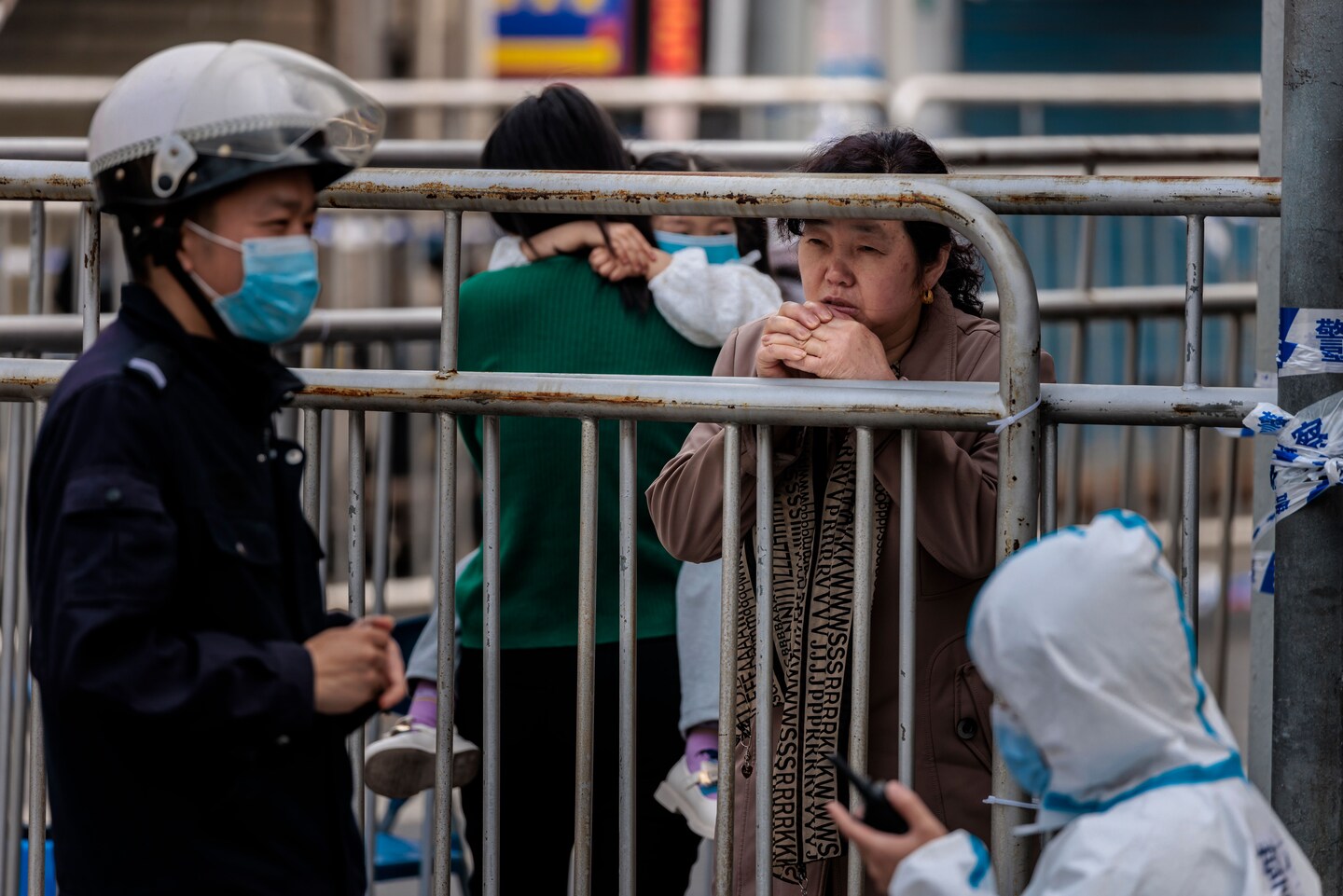As China’s covid outbreak expands, whole cities and provinces are sealed off and key industries closed

The surge — and accompanying lockdowns that could severely harm the recovering economy — may force the country to rethink its approach to the virus as much of the world begins to ease pandemic restrictions. Hong Kong’s key Hang Seng index plummeted by 5 percent on Monday over covid worries.
The National Health Commission on Monday reported 2,125 new locally transmitted coronavirus cases across the country. Since last week, cities have ground to a halt to stop the outbreak, which comes as the country enters a critical year for transitions in the Chinese leadership, with President Xi Jinping set to take a controversial third term.
In Shenzhen, officials ordered the city’s more than 17 million people to stay at home starting on Monday through March 20, after just 150 new cases were reported over the weekend.
The city is home to key Chinese companies like Huawei, electric carmaker BYD and Tencent. Apple supplier Foxconn suspended operations, as did circuit board makers Sunflex and Unimicron, also a supplier to Apple and Intel.
Authorities in the northeastern province of Jilin on Monday barred its 24 million residents from leaving, marking the first time officials have sealed an entire province since January 2020 when Hubei was put under lockdown.
Health officials said hospitals were overrun because of the rapid increase in cases since Friday. The province recorded more than 4,605 coronavirus cases on Saturday, while 3,868 residents have tested positive in preliminary tests but were not yet included in the official tally, officials said.
All middle and elementary schools in Jilin must revert to online classes, while students and employees at universities must remain on campus, officials said. Authorities are building four temporary hospitals to house more than 10,000 coronavirus patients.
In the locked-down provincial capital of Changchun, Toyota also halted operations at its plant on Monday.
In Shanghai, the country’s most populous city with more than 24 million people, authorities have sealed off housing compounds and halted intercity bus service while requiring all new arrivals to have a negative coronavirus test to enter. Residents have been told not to leave unless absolutely necessary.
In Qingdao in Shandong province, the Laixi district of more than 700,000 people was put under lockdown after officials found more than 1,600 locally transmitted cases since March 4 through mass testing. In Hebei province, the district of Guangyang, home to 500,000 people, has also been put under lockdown.
In neighboring Hong Kong, authorities are trying to contain an outbreak that has killed almost 4,000 people. In Shenzhen’s Futian district, which borders Hong Kong, authorities inspected homes, checking in closets and under beds for possible covid cases, including residents illegally crossing over from Hong Kong, according to the Caixin media outlet.
The recent outbreak comes weeks after Beijing hosted the Winter Olympics, taking great pains to make sure the event did not result in a new surge in cases. The country’s success over the virus compared with other countries has been held up by Chinese leaders as proof of the superiority of the Chinese system under Xi’s leadership.
Chinese Premier Li Keqiang, who last week called the pandemic the “biggest challenge” the Chinese economy has faced during his second term, pledged to expand the economy by about 5.5 percent, an ambitious target amid disruptions to global trade and faltering domestic demand.
Several officials have been punished for the latest outbreak, underlining the political importance of containing the virus. In the manufacturing hub of Dongguan in Guangdong, six officials have been fired, while in Laixi, in Qingdao, the deputy mayor was dismissed less than two weeks after she had been appointed. In Jilin province, three officials including the party secretary of Changchun and mayor of Jilin City were removed.
Zhang Yan, a Jilin health commission official, on Sunday criticized the response from local authorities. “There is insufficient understanding of the characteristics of the omicron variant,” he said, calling local officials’ judgment “inaccurate.”
The sudden and aggressive lockdowns, often in response to a relatively small cluster of cases, threaten the country’s economic recovery while raising questions about the long-term sustainability of the approach. Officials have hinted that the country may move away from its initial policy of eliminating the virus.
Zeng Guang, an adviser to China’s Center for Disease Control and Prevention, said in a post on the microblog Weibo last month that the government was developing a road map to “coexistence” with the virus. His post was later removed.
While praising the country’s strategy of reducing infections as much as possible, Chinese commentator and former Xinhua editor Ming Jinwei wrote in an article on WeChat on Monday, “if we hope to return to normal as soon as possible, the future epidemic prevention strategy should no longer be to pursue absolute ‘zero infections.’ ”
Former Global Times editor Hu Xijin urged cities with only dozens of cases to not impose lockdowns on residents, writing, “what is needed is to harm people’s economic livelihoods as little as impossible. … This is what people want.”
On Weibo, some Internet users vented their frustration with the strict measures. “Will I have to wear a face mask for the rest of my life and only be cremated if I can show a negative nucleic acid test?” one asked.
Lyric Li in Seoul and Vic Chiang and Pei-Lin Wu in Taipei contributed to this report.






